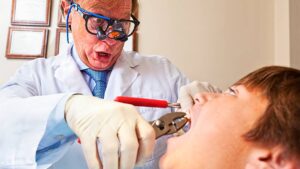Dr Boreham’s Crucible: Why unlisted Qbiotics has a good chance of cracking the cancer market

Pic: Charnchai / iStock / Getty Images Plus via Getty Images
Your columnist normally confines his musings to publicly-listed biotechs, but given the current foment readers may be relieved to read about an unlisted one that isn’t losing large chunks of its value by the day.
Qbiotics, you see, is a public unlisted company. It has plans to list, but given the woeful market this is likely to be later rather than sooner.
In their heart of hearts — and whether they’re public or private — life science companies aspire to develop the blockbuster therapies to rid humans of curses such as cancer, heart ailments, Alzheimer’s disease and, of course, coronaviruses.
But for Qbiotics chief executive and microbiologist Dr Victoria Gordon, developing drugs for the human and animal markets is not the awkward mix of motives it is often perceived to be.
“The vet market is not too shoddy, with blockbuster drugs worth $100m or more,” she says.
Qbiotics is doing more than just dreaming. In January, its canine cancer drug, tigilanol tiglate, was green-lighted by the European Medicines Agency — the company’s first regulatory tick of approval.
Branded as Stelfonta, the drug is indicated for all grades of canine mast cell tumours, the most common form of doggie skin cancer.
Bear in mind that one in four dogs will develop cancer, with half of them over the age of 10 dying from the disease.
At the same time, factors such as the rise in single occupant households and increased pet insurance coverage increase the ability and willingness of owners to pay.
And on the human side, tigilanol tiglate (EBC-46) is in phase I testing for a variety of solid cancers, notably the difficult-to-treat head and neck squamous cell carcinoma (HNSCC).
Dr Gordon describes tigilanol tiglate as a new approach to tackling cancer.
“The drug works largely through specific protein kinase C (PKC) activation,” she says. “It locally stimulates the immune system resulting in destruction of the tumour mass and the tumour’s blood supply, followed by rapid healing of the site with minimal scarring.”
Tapping nature’s drugstore
Dr Gordon and her forest ecologist husband Dr Paul Reddell stumbled on the therapeutic benefits of tigilanol tiglate while fossicking in rainforest in the Atherton Tablelands of Far North Queensland.
They observed that animals spat out the seed of the blushwood tree, pointing to a non-toxic deterrent preventing the critters from eating and thus destroying the seed.
“We had an idea about how to discover biologically active small molecules from the natural environment more effectively,” Dr Gordon says.
To abbreviate a long story of discovery, they isolated EBC-46 and tested it on a range of animals. The molecule proved safe, but also active against tumours.
Both were in the employ of the venerable CSIRO at the time, but in 2000 Dr Gordon quit her day job to form Ecobiotics. Dr Reddell later joined and they formed Qbiotics in 2004 (into which Ecobiotics was merged).
On March 15 the company celebrates its 20th birthday. “It’s been an interesting and long journey,” Dr Gordon says.
EBC-46 was chosen as a clinical candidate after a “hard cull” of dozens of other prospects.
Dr Gordon says the drug candidates need to be safe (obviously), patentable and “novel”.
Oh – and there has to be an addressable market.
“We pride ourselves on being a little bit different,” Dr Gordon says. “We push our drugs (in testing) and actually try to make them fail.”
Only other vets would understand
Stelfonta’s approval by the European Medicine Agency was supported by a pivotal study of 123 hounds with mast cell tumours, which account for one-fifth of all canine cancers.
Twenty-eight days after a single injection of the drug, 75 per cent of the dogs had a complete response. The randomised and blinded trial involved an untreated control group that received rescue therapy after the 28 days.
The trials were carried out across 11 clinics.
According to Qbiotics veterinary oncologist Dr Pam Jones, the current standard of care is surgery – but anaesthesia is dangerous for older dogs and brachycephalic breeds (short-snouted ones such as bulldogs, boxers, pugs and shih tzus).
“Stelfonta is administered by injection directly into the tumour mass,” she says. “Generally, a dog undergoing treatment does not need to be sedated or need local or general anaesthesia.”
Qbiotics is backed by French vet drug house Virbac, which has signed on to distribute Stelfonta in the US, Europe and the UK — which just about covers the world of animal care.
Dr Gordon is suitably mysterious about the fine print of the deal, but says in effect it’s a 50-50 revenue sharing arrangement.
While the European approval covers 27 countries, Virbac is gearing up to launch Stelfonta initially in Britain, France, Spain and Germany. “We’re really happy to be aligned with Verbac; it’s been a good relationship,” Dr Gordon says.
Meanwhile, the company is putting the finishing touches on an application to the US Food and Drug Administration, with a submission also lodged to the Australian Pesticides and Veterinary Medicines Authority last September.
Dr Gordon is confident these authorities will not require further trials.
The Brits make for an attractive market, thanks to the legacy of the dog-loving Queen Victoria. But Dr Gordon says there’s also appeal in Russia, China and Japan.
While Dr Gordon believes Stelfonta could “potentially” move beyond that $100m-a-year ‘blockbuster’ threshold, the company will really only know the European potential when it starts selling.
EBC-46 does the trick with human trials
The human trials, we stress, are less advanced, but promising nonetheless.
The peer-reviewed journal, The Lancet’s Ebiomedicine, has published the data from the company’s first-in-human trial that tested EBC-46 on patients with a variety of solid tumours.
The 22-patient study was performed at four Australian hospitals, covering nine tumour types including squamous and basal cell carcinomas, melanoma, breast cancers and metastatic colorectal cancer.
“Signs of clinical activity were observed in all nine tumour types, even at the lowest doses,” the company says.
“As this was a first-in-human, single dose safety study, the expectation of a strong anti-cancer response was low.”
But voila! The phase I study showed that six patients (27 per cent) had a treatment response, with four patients (18 per cent) showing full tumour destruction.
The company is now recruiting for a phase I/II trial of EBC-46 in patients with head and neck squamous cell carcinoma.
The study will enroll up to 40 patients from the Tata Medical Centre in Kolkata and the Tata Memorial Hospital in Mumbai, as well as Australian clinical sites.
A combination trial with an existing cancer drug is also planned.
Qbiotics pipeline also includes EBC-1013 for venous leg ulcers and burns and blast wounds in humans, as well as acute and chronic wounds on horses.
Finances and performance
Qbiotics was eyeing an ASX listing in early 2022. But this timetable is subject to change and the company is not in a hurry — even less so given the bombed-out bourse.
“A problem with Australian biotechs is they are desperate to raise funds and go the listed environment too early. We are now ready to choose to go rather than be pushed,” Dr Gordon says.
To prove that point, Qbiotics has just raised $17.75m in a private share placement, valuing the entire company at $255m.
Along the way, the company has raised $110m from a shareholder base that currently numbers 2230 investors, mainly wealthy individuals.
“They have been incredibly loyal over the years,” Dr Gordon says. “Some have held for 18 years, so can be truly described as patient investors.”
Dr Gordon and Dr Reddell both hold about 8 per cent and are the biggest shareholders.
The company provides a secondary market, with 19 off-market trades executed in calendar 2020 so far. Mainly involving small volumes, the trades were struck at between 58c and 95c (the most recent were two trades of 10,000 each on January 20, at 75c apiece).
Punters can find the details on the company’s website.
Dr Boreham’s diagnosis:
Naturally, the animal market faces stiffer hurdles than the human one in terms of what customers are willing to pay. Mind you, the bar is being raised all the time given improved pet insurance coverage and the willingness and ability of folk to spend up big on salvaging their canine companion.
Dr Gordon said the company had been careful to ensure the pricing was no higher than the standard-of-care of surgery, which sounds like a sage strategy.
Qbiotics’ endeavours are supported by a high-calibre board: chairman Rick Holliday-Smith also helms Cochlear (ASX:COH) and the ASX, while Professor Bruce Robinson chairs the National Health and Medical Research Council.
Neville Mitchell was Cochlear’s chief finance officer, while Andrew Denver is the former executive chairman of Universal Biosensors (ASX:UBI) and a current director of Cochlear.
Recent appointee Dr Sue Foden has an extensive background in overseas drug development and commercialisation.
Dr Gordon has been a director of Biopharmaceuticals Australia, a member of the Queensland government’s Biotechnology Advisory Council and chair of the Australian Rainforest Foundation.
In 2004, Queensland premier Peter Beattie awarded her a gong for services to the biotechnology industry.
While there is no recipe for assured success in bioscience, the boardroom oomph means Qbiotics has an enhanced chance of cracking the market – whether it is a two-legged or four-legged curative.
Disclosure: Dr Boreham is not a qualified medical practitioner or veterinarian and does not possess a doctorate of any sort. But he can distinguish both ends of a dog – the waggy bit and the slobbery bit.
This column first appeared in Biotech Daily.
NOW LISTEN TO:
Related Topics

UNLOCK INSIGHTS
Discover the untold stories of emerging ASX stocks.
Daily news and expert analysis, it's free to subscribe.
By proceeding, you confirm you understand that we handle personal information in accordance with our Privacy Policy.








